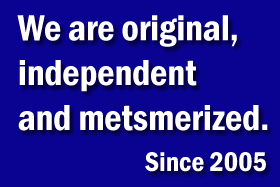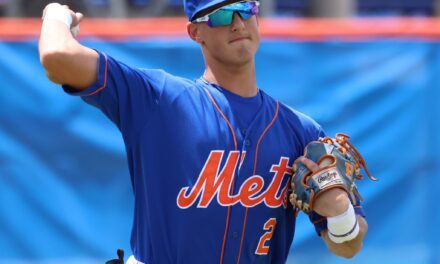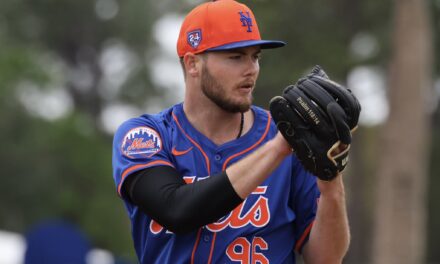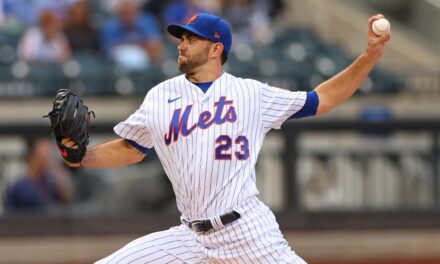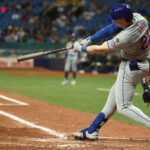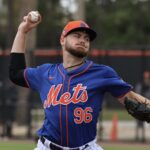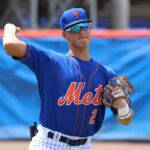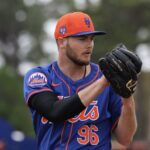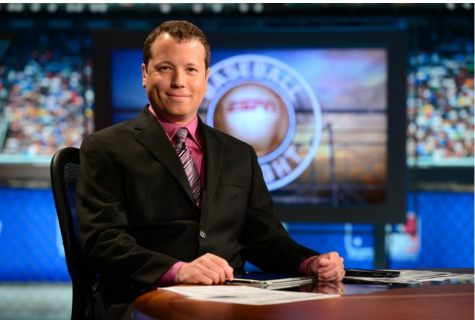
Earlier this week, I had the privilege of spending 40 minutes on the phone with ESPN Senior Baseball Writer Keith Law. Keith is a lead baseball analyst for ESPN.com and senior analyst for Scouts.Inc. He formerly worked in the front office of the Toronto Blue Jays. I interviewed Keith before last season and he graciously agreed to do it again with the 2016 season approaching. Check out what Keith had to say about the state of the Mets minor league system, their young core players, pitching, infielders, positional logjams, top prospects, and so much more. Then hop down to the comments and share your thoughts! Here we go:
Tommy Rothman, MetsMerized Online: Hi Keith, thanks a ton for agreeing to do this again this year. So I guess I’ll start with the farm system rankings. You just put out your MLB rankings, your top 100 rankings, and your team-by-team rankings. The Mets fell from number 4 last year to middle-of-the-pack this year. Obviously some of that is because they graduated guys like Noah Syndergaard and Michael Conforto who are no longer “prospects,” but they also traded away some prospects to get the guys they added during the season. So how would you size up the state of the Mets’ farm system, not only in terms of the prospects who qualify for your rankings, but the young core in general?
Keith Law, ESPN: Well the young core’s a lot better, obviously, if you’re looking at most of the rotation. And if you’re looking at most of the rotation, it depends where you draw the line between who’s young and who’s not, you could argue that Matt Harvey and Zack Wheeler are still a part of that young core. I’ve always been a big Michael Conforto fan, I obviously ranked Noah Syndergaard very high the last couple of years. The only part of that young core I’ve never been particularly high on is Steven Matz, because the injury history is so bad.
But I think their young core is one of the strongest in the game, which will [enable] them to continue to contend even though they’re not gonna spend that much money— the ownership group has made it clear that they’re not gonna spend the way a New York club should spend. So it’s critical to continue to compete through the farm system. And they have plenty of pitching for right now— they have no pitching depth. But they have plenty of pitching for the present, and you do have a lot of position players coming, as some of their guys… say, David Wright‘s tenure comes to an end, or Lucas Duda they decide to let walk, which I’m sure they will, and replace with Dominic Smith. You’ve got replacements for most positions on the diamond. So I think they’re in really great shape, I wish they’d spend more money obviously, but if they’re not gonna do that, they’re still in a great position even after the trades.
Tommy: Yeah, I was pleasantly surprised to see that when Yoenis Cespedes fell back into their range financially, they realized it was the move they had to make and pulled the trigger. But they certainly won’t be competing for those longer-term deals. So with that in mind, you mentioned the pitching depth— they do have the pitchers now, but after they traded guys like Michael Fulmer and Casey Meisner for Cespedes, Tyler Clippard, and other pieces, in the event of injury, they don’t have as many young arms in the pipeline. So obviously young pitching is the Mets’ strength, but is it also something they need to shore up in terms of depth?
Keith: I mean, if they have the opportunity to add prospects somewhere, sure, adding more pitching would be great. I don’t know if they’ll target pitching in the draft because they’ve never drafted that way, it’s always been “best player available” since Tommy Tanous took over as Scouting Director. I want them to continue to do that. But the strength of the draft this year is probably college pitching anyway, so if the right one happens to fall into their lap, great, they certainly need it. But they’re not really in a position where they’re going to be able to add pitching prospects.
It might make sense for them to target somebody who might be a good sixth starter for them this season, who could spend part of the year in Las Vegas, but who you figure is probably going to make 12 to 14 starts this year for the big league club because you always need that. I don’t know who that’s gonna be, it might have been Fulmer if they hadn’t traded him for Cespedes, but there was nobody backing him up, even if he were still there, you could probably still ask the question, ‘What if Fulmer gets hurt again, who’s behind him?’ And the answer would be, probably nobody.
Tommy: Vice President of Player Development and Scouting Paul DePodesta left a couple months ago for the NFL. What impact do you think that will have on the Mets organization and how they do things?
Keith: Well, I think that’s a big loss, because I think Paul was kind of a philosophical thought leader too, helping drive direction in the draft and player development, and not just losing his intelligence, but losing his voice in the room, could have a lot of impact. Because I think you really had a split camp there last year where folks in the front office didn’t want to trade from the prospect depth to make a short-term run because they were looking at a long-term run of contention with this young core— and they still are. So don’t trade from it unless you’re getting longer-term assets in return. Instead they traded who I thought was their two best pitching prospects at the time in Fulmer and Casey Meisner for rentals. Without DePodesta there, is there going to be a strong voice in favor of continuing to build from within as opposed to making those short-term trades, as opposed to signing a Michael Cuddyer? I don’t know the answer to that. I will say I retain very high confidence in the amateur scouting department because they’ve had such good results and produced prospect value and produced big leaguers over the past couple of drafts since Tanous took over, and I think they’ll be able to continue to do so.
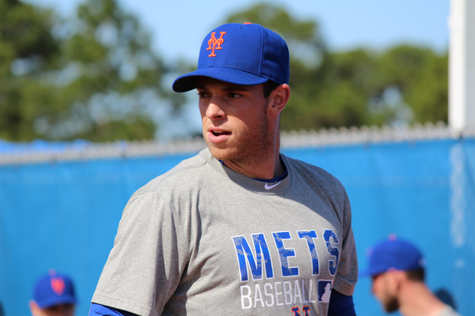
Tommy: So like you said, you’ve never been high on Matz. Last year he didn’t make your top prospects list. Now you have him up there. Obviously it’s big that he could stay relatively healthy and it obviously helps his ranking that he pitched in the Majors, he pitched in the World Series… how do you analyze Matz, as an individual prospect but also among the Mets group? My personal opinion is that, well, I’m lowest on him of the four, or the five. What are your thoughts on him?
Keith: I would agree. I think he’s clearly behind the other guys. For stuff, it’s an above-average to plus fastball, a plus-or-better changeup, he will show you at least a solidly above-average breaking ball, it’s control more than command, and the delivery is still a little bit mechanical although it’s a million miles better than where it was in high school. But he has still yet to reach 150 innings in any regular season in his career, and he was drafted in 2009. And even last year, which was by his standards a full season, he was out twice with injuries that took him off the field for a period of time. And part of why he wasn’t on the list last year, and when I said it was kind of a fourth-starter type ceiling, and part of why he’s lower this year than Mets fans would have wanted him, is because I have no reason to believe he’s going to be a 180 or 200 inning starter, and certainly not on a regular basis. And a guy who pitches like a #2 starter, but only throws 140 innings a year, that’s not a #2 starter, that’s somebody who, by WAR, is going to produce more like a #3 or a #4.
If he hadn’t had— somebody asked where would I have him if he hadn’t had all the health problems, I said I wouldn’t have ranked him at all, because he would have been their #2 starter by now going into last season. It’s not that I don’t like him, but I have to be realistic about a guy who’s had this many injuries, some of which seem like they’re likely to recur, all of which I think adds up. Wheeler, Harvey, Syndergaard— who is like a machine— or Jacob deGrom, it’s funny, because three of those guys have had Tommy John Surgery, but we sort of shrug that off, whereas Matz it’s like almost anything he could break has broken at some point. And I feel bad for the kid, but we have to be kind of callous when looking at these guys’ futures.
Tommy: So if the Mets did need to make a move, or wanted to make a move, to get a major impact hitter or another asset— obviously Matz probably has the lowest trade value of the four, but he does still have value— is that the guy you think they would and should look to trade to make it happen?
Keith: I’ve never had that discussion with anybody in the front office, specifically in terms of trade value. I think my ranking of Matz has reflected their internal sense of Matz relative to the other pitchers, I think they’ve always had Syndergaard higher since he came into the system, obviously you know what they think of Harvey and deGrom, and I think they believe that Wheeler, as long as he’s back at 100% this year, is also going to be ahead of Matz. And I think Matz’s trade value is going to depend entirely on whether they find a trade partner undisturbed by his medicals. If somebody looks at him and says, ‘we’re comfortable with it,’ says that he’s gonna be healthy and he can throw 160 innings next year, then they’re going to get a really good return on him. It’s possible that there could be something we don’t know about, that would stop any potential trade. That’s the kind of thing we won’t find out— if ever— until there’s a trade out there that falls through because the other team saw something they really didn’t like. But there I’m just speculating…
Tommy: Yeah, when I watched Matz in the playoffs, and I guess throughout the season, it seemed like he really was just a five-inning pitcher. He was fine, he was solid through five innings, but—
Keith: Yep. And that’s fine, if you’ve got the long guys in the bullpen. The Cubs have Adam Warren, and Travis Wood, and others, if you’ve got a couple of those guys, that’s fine. A five-inning starter as your nominal fifth starter is fine. I don’t know if the Mets are set up to have a five-inning guy as a fifth starter.
Tommy: So with deGrom, I would say he has the least— he doesn’t have Thor’s curveball, for instance. But he’s gotten it done two years in a row now. He’s shown that 2014 wasn’t a fluke. But sometimes you’re watching and you still don’t know how he does it, how they don’t manage to hit him. Do you think he’s a candidate for regression going forward? What are your thoughts on deGrom?
Keith: I’m all in. I don’t think he’s a candidate for regression. I think his fastball life is real, I think his aggressiveness is real, I’m a huge fan of anybody who’s that athletic on the mound, I think he adds value with his fielding, obviously he adds a little value with his hitting. But he can compete really well, he throws strikes, there’s some command, I think there might be even better command going forward, because he doesn’t have the same pitching experience as these other guys [deGrom used to be a shortstop], I’m a huge fan, and, no, I’m not worried about regression.
The only guy in the rotation— we’ve talked about Matz— of the other four, the only one I’d say I’m worried about, I don’t know what Wheeler’s going to look like, or be able to handle, in his first year back from Tommy John. But I was an enormous Zack Wheeler fan going all the way back to high school. If he’s still that guy, their rotation might be the best in baseball. With Matz as the five, Matz could be the best number five starter in baseball. I’m not worried about Thor, I’m really not worried about Harvey— Harvey gave us nothing to worry about last year— and I’m certainly not worried about deGrom. I think deGrom being better in the Majors than he was at any point in the minors is just a reflection of that he didn’t pitch a lot around Tommy John Surgery after signing, and I think the stuff picked up right around the time he got to the big leagues.
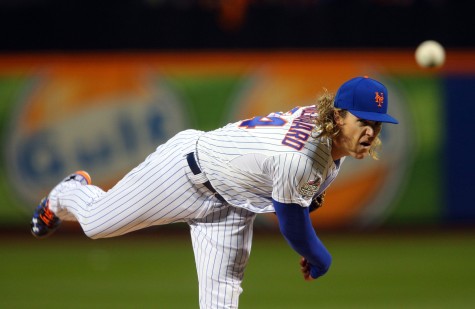
Tommy: Obviously with Harvey, his first full year, his second year overall in 2013, he had a monster season. Thor is going into that season now. What upside do you think he has, not going forward, but just for 2016 specifically?
Keith: Yeah, I think he could— look, I still think there’s growth here as a pitcher, I’ve talked in the past about how he’s a guy who seems to make gradual adjustments and come back to the curveball, which in high school was a 30 or a 35 (on the 20-80 scale), in the Blue Jays system was like a 40-45, around the time of the trade to the Mets it was average, or maybe a little less than average, but everybody liked where it was heading, and now, you’ve seen with Thor it was pretty consistently an above-average pitch for him [last season]. I know he was worth about 3 Wins Above Replacement in three-quarters of a season, I see no reason he can’t pitch at that level over a 200-inning season, because he’s a horse. He’s built like a horse, the delivery is easy, he repeats it, he does everything you want in a pitcher you’d ask to go out and throw 200 innings for you. And the command and control were better last year. That’s another guy— pitchers get to the Big Leagues with the Mets and they pitch better. And I don’t think that’s a fluke. We’ve seen this with a bunch of guys now. And I think that’s true of Thor too, where— could he be a 5 WAR pitcher over a full season? I think it’s within reach, as long as he’s healthy. And he’s always been healthy. He has the best track record of health of anybody in that rotation. Yeah, I think he could do it. (Note for reference: deGrom had a 4.7 WAR in 191 innings last season).
Tommy: And then for the other main guy the Mets got in the R.A. Dickey trade, Travis d’Arnaud. Every year we think he can’t possibly have another freak injury, and then he gets hit by a ball a week in. When he’s on the field, I think the consensus amongst us fans is that his defense has been a bit disappointing, especially his throwing. But he’s still young. How would you evaluate him and his opportunity to grow this year and become more of a star all-around catcher?
Keith: I really wonder if his future is at catcher— and I said this last season too— because he can’t stay healthy. And he’s had at least one concussion, which last year I was concerned about just in a baseball sense, now I’m concerned, you know, in a human sense.
Tommy: Yeah.
Keith: So if you wanna remove him from that risk of injury, well if they were any other club, you could find a spot for him, first base, left field, but they’re full right now. I don’t know where you put him. Because they could put Kevin Plawecki behind the plate 140 games, and I think he’d be great in that role. He’s a better receiver, certainly, and I think he’s even more consistent in controlling the running game, but he doesn’t give you Travis’ potential for offense. I think Travis’ bat might play in left, and you might get him on the field more, it’s just not an opportunity that’s open to the Mets. So since he’s clearly going to be on the 25-man roster, my guess is he catches a bunch, gets hurt at some point, they’ll try to mix him in at other positions as they need to, if Duda needs a day off, or Conforto should go on the DL for whatever reason, they could just try d’Arnaud out there, maybe think long-term to see if there’s another opportunity. But I wonder if he’s a guy who ends up traded because they have guys at the other positions where he might play. He’s not gonna run Conforto off of left field, clearly. And if the defense is an ongoing concern— and I agree with you that it’s disappointing— maybe Plawecki ends up the long-term catcher instead.
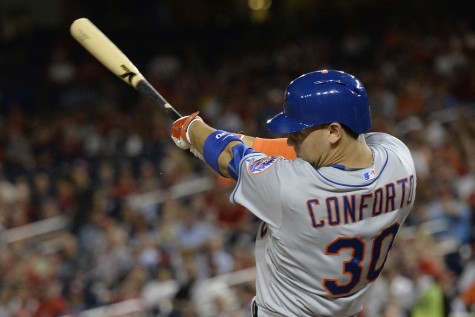
Tommy: So you mentioned Conforto, I don’t think many people saw him arriving by July, establishing himself as a starter, and helping during the World Series run. So I know you were definitely extremely high on him when we talked last year, but were you surprised by how quickly he developed and got up to the Majors?
Keith: The only thing I was surprised about was the power output in the Big Leagues— and it was only half a season, so I don’t want to read too much into it— but otherwise that’s kind of what I thought he would be. I thought he was the best college hitter in the draft in 2014, I thought it was a great pick when they took him 10th overall, I thought his approach was really advanced when he worked through the low minors, and I was critical of the Mets when they started him in the Florida State League because he was too advanced for that. I thought he had a lot in common with [young Cubs slugger] Kyle Schwarber, in terms of proximity to the big leagues. Where Schwarber has the higher upside because he’s a potential catcher, I thought Conforto was further along. I was probably a little more surprised by how good Schwarber was as quickly as he was, than I was by Conforto.
Tommy: I think a lot of people will be surprised, when they look at your prospect rankings, by how high you have Wuilmer Becerra, because a lot of people who know him just know him as the throw-in in that amazing Dickey trade. But how close do you think he is to having a chance to contribute, either to the Mets or to another team if they decide to move him?
Keith: He’s probably three years away, I mean maybe it’s a little faster now because he’s 20. I thought it was a real breakout year for him, where he always had the ability— Mets people were stoked when they got him in the trade— but you knew it was a long-term play for them. The approach there is good enough, so that he can get to the strength and to the power. And you and I talked last year about what a terrible park Savannah is for power. So maybe Becerra gets out this year, gets to the Florida State League and starts to hit for a little more power, maybe the next year he gets to Binghamton and then the power really blossoms, because he’s out of those deadly A-ball parks that I think haunt a lot of those Mets hitters, where they get there and they really can’t hit for any power. My only real concern on him— other than that he’s young and that there’s some volatility there— no one is really confident in his outfield defense, so I think you’re just hoping he ends up playable, at either one of the corner spots. And then if he hits for the power I think he’s gonna have, it’s not really gonna matter.
Tommy: So with people worrying about defense with prospects, the idea that the NL might get a DH at some point, would that change the way you value prospects, just because you won’t have to say ‘he can start but he’d need to be on an AL team,’ would that be a big shift for you and other people who look at talent from a young age and factor in the fielding?
Keith: I can only speak for myself here, but I think it really wouldn’t affect the rankings because I try to make all my rankings team-agnostic, so that if I’m evaluating a player for an NL team, who looks like he’s going to have to be a DH, like Josh Naylor with the Marlins, I evaluate him exactly the same. His role is limited. He’s maybe a DH, he may be a first baseman, we’ll see. But it’s a bad body, and it could potentially end up at DH. And that’s going to drastically reduce his value, because we know replacement level is higher, anybody can DH. So it’s not gonna change that. It may actually change his market value, because you’re doubling the number of teams that could have an opportunity to play a player like that. Like where the Cubs look at a prospect like Daniel Vogelbach and say, ‘The kid can hit, but we have zero use for him.’
Tommy: The Mets have a lot of outfield depth, so one guy who’s kind of being forgotten about as a prospect is Brandon Nimmo, obviously they picked him very high several years ago, despite him having not— I don’t think he even played high school baseball.
Keith: Right. They don’t have it in Wyoming.
Tommy: So where would you say he is in terms of his development at this stage?
Keith: I would describe his development as kind of stalling out, where he got to double-A, and did not take a step forward. And it looks like he’s not taking a step forward, he moved to Vegas at the end of the year, and still didn’t hit well, and still didn’t find any power. And nobody seems to think he can play center field. So now you’ve got a corner guy, with some on-base ability, but no power, and isn’t really hitting for a high- enough average that you feel super confident in the OBP, and I don’t think that’s a regular anymore. When he was 19 and drafted, I could see the pick, but it has to come with power. And I don’t know if the lack of power is a hand strength issue, or— he had a lot of problems with his knees when he was younger, maybe he’s not generating that power from his legs— but at some point I have to look away from the body and just look at the production. And even in a more favorable power environment, he’s still not hitting for power. And given his age, and how long he’s been in the system, and especially the fact that he went to Vegas and didn’t find power, I just sort of feel like, I don’t know, maybe it’s not gonna be there. And that would make him a fourth outfielder. And probably a fourth outfielder soon, but nothing more than that.
Tommy: And now for the middle infield, obviously it’s going to look a lot different this year with Wilmer Flores bouncing around, and then Asdrubal Cabrera at short, and then Neil Walker instead of Daniel Murphy at second. So the first question is, whether you think they upgraded, downgraded, whether there’s much of a shift going from Walker to Murphy on both sides of the ball?
Keith: I’ll say I like Walker more than Murphy. I think Murphy was pretty bad defensively and I think it really cost them, maybe even more than the defensive metrics might reflect, because of the way they might have had to compensate with guys at other positions. Because he never really could play second base. They were just trying to find a spot for his bat, and I respect that approach, but it didn’t work. Walker can play second base. He’s not great, but he’s turned himself into a perfectly serviceable defensive second baseman.
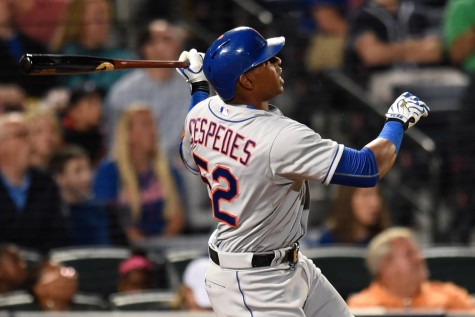
Tommy: So speaking of defense— before I ask you about Cabrera— with Cespedes, he won a Gold Glove last year in the AL, in left field, obviously those aren’t much of a reliable stat, but he has the best arm in baseball and he has good speed. But people view him… statistically there are a lot of people who argue he’s a disaster in center field. Do you think there’s room for his physical tools to translate and for him to become a good center fielder now that he’s going to be playing there full time?
Keith: I don’t think so. Having seen Cespedes all the way back to his first Spring Training in Oakland, where they did run him around in center, no I don’t think so. I think he can really be excellent in a corner, but it’s too much of an ask to ask him to play average or better defense in center field. Maybe it’s something they can live with, because they want his power, because the middle of the order is a little short on power— it’s a much better OBP lineup, especially because of Conforto, but definitely light on the power. It’s a trade-off. And it may be that that trade-off is fine for them, but I do think they’re gonna miss— 2014 Lagares back in center would be an awfully nice thing to have.
Tommy: So what do you think goes into that, the idea that someone with great physical tools, and definitely the speed to have good range, could be great in left, what makes him just so hopeless out in center? Is it route-running, how he reads fly balls, or…
Keith: I mean I don’t think he’s super fast, either. It’s not like he’s a 70 runner, and his first step is not that quick. Underway, he’s fast. And underway, I’d wanna get the hell out of his way. But speed in center, speed translating to defense in center is often about that first step quickness. I don’t think he has that. Maybe I haven’t seen him enough in center, other than in the playoffs, where he didn’t look good, if you really evaluate that. I don’t think that’s gonna be— or I don’t think that is— a strength of his. Where in a corner it’s a little bit less of an issue, and you mentioned the Gold Glove, it’s probably because he can really throw, the guy’s a human highlight reel if you let him throw. And really, if you run on him, you’re stupid. Because it’s, not only is it strong, it’s reasonably accurate. It’s not an arm I would actively want to test.
Tommy: So you mentioned the lineup earlier, you’re right that there’s not a ton of 30-homer guys— you’ve got Cespedes, and maybe Duda. But one thing they have that they definitely haven’t had in a long time is that when you go up and down, everybody in that lineup should be able to hit 15 home runs, plus, including Cabrera. What’s Cabrera— what does he have, first in terms of power, and then— because he’s been so streaky, he was a star a few years ago, then he had a slump, but last year he had a great second half— what should Mets fans, first of all, expect, and also, be able to hope for?
Keith: I mean, the big problem with him is that he can’t play shortstop. He CANNOT play shortstop, and he hasn’t been able to play shortstop for several years now. So I don’t understand— I mean yes, this is the front office that decided Wilmer Flores could play shortstop, he really couldn’t play shortstop either— but then to go from Flores to Cabrera— is Cabrera really better than Flores, at anything? I mean Flores, I know the production wasn’t great, but the swing’s good, he puts the ball in play a lot, and I still think he’s going to come into some power, whereas Cabrera, outside of that one crazy first half power-wise he had with Cleveland a couple years ago, you kind of never got it. So I don’t understand— do they think they’re getting a better defensive shortstop than they really are? Do they think he’s going to turn into a 20 homer guy? Because I don’t believe that that’s the case.
I didn’t understand that signing at all. It’s part of why— somebody asked me about the Mets offseason— it’s great that they did spend some money, but what if they had taken the money they gave to Cespedes, and Cabrera, and Alejandro De Aza, and thrown it at one of the more premium free agents on the market. They could have done something better. Cabrera over Flores, I don’t even know if that’s an upgrade, and if it is, it’s a fairly small one.
Tommy: So prospect-wise in the middle infield, I know you’re extremely high on Amed Rosario and you have been for awhile, and then there’s Gavin Cecchini, who you put in your top 100. I know Cecchini’s probably closer in terms of an MLB timeline, but how would you analyze those guys offensively and defensively, and in terms of when you think they’re going to be able to contribute?
Keith: Cecchini’s glove is ready. His arm, he had a little bit of a throwing issue, last year. And he was better in Fall League, he was even better in August or so, I know they started to work on him with— particularly if a runner was going fast, he hesitated a fraction of a second, and suddenly looked up and realized the runner was getting down the line, then he’d rush a throw and often overthrow the first baseman. Just trying to work with him on that, it looked like he was better in Fall League. If that problem is resolved, his glove is ready. A half-season or more at Triple-A is not gonna hurt him because he’s really only been performing offensively the way we expected when he was rafted for about a year and two months, or so. So I’m fine with taking it slow with a guy like that.
Rosario, it’s still more tools than performance. This will be a big year for him. Obviously they jumped him a level last year, which was aggressive, and I think in the context of his aging and experience, he had a great year. But now, alright, now let’s go, let’s see the harder contact, let’s see the power, because we think it’s all there, but again he pays in a crappy offensive environment in St Lucie. Let’s see him go to double-A and start to produce a little more. He doesn’t have to be a superstar statistically, because given his youth, if he performs even a little bit, if some of that power starts to arrive, I think we’ll all feel a lot better about him getting to that star upside. But I think he’s a solid two years away from doing anything in the Majors, and he may be a guy who gets to the Big Leagues, and it’s defense first and the occasional home run, but it takes another year or two for the whole offensive [set] to come together. I’m just betting on the huge upside, because from tools, I don’t think there’s louder tools anywhere in the system.
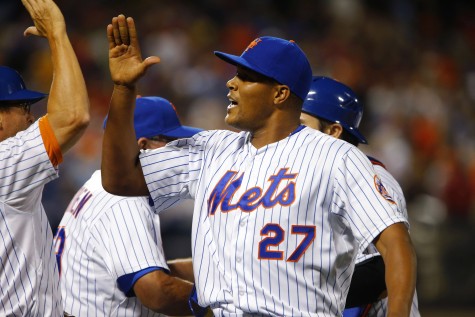
Tommy: So now I have a few questions about the bullpen. What are your thoughts on that situation at large?
Keith: On the Major League bullpen? I didn’t like the Clippard acquisition, in part because I didn’t think he was that huge of an upgrade over a Hansel Robles, I think they paid for experience. Then they turned around and picked up Addison Reed for lesser prospects, and that made more sense, and Reed carried over so they get more than a couple months out of him. I think that they had enough power arms, still have enough power arm relievers, sticking around the system that they can certainly patch together a good enough, more than good enough bullpen for than this year, with Jeurys Familia being potentially a dominant, top five, top ten closer in the game for a couple years here. I certainly feel way better about their bullpen now than I would have going into last season. And I would really like to see them trust that, and not do what they did. Don’t go out and trade real prospects, like Meisner, for bullpen help, while that bullpen help is already in hand, somebody in the system, who maybe can convert. It’s not gonna be a guy like Robert Gsellman. They have power arms sticking around, who could potentially go into that role for them.
Tommy: So like you said, you’re not a big fan of big trades for relievers at the deadline. But because a lot of teams usually do make some veteran relievers available, do you think they still have some of the depth, possibly at the major league level, to—
Keith: Oh yeah. To go get one? Yeah. Absolutely. Well because you can swap a position player who doesn’t fit for you, to go get a reliever. Or— Nick Pivetta was the cost for Jonathan Papelbon. I do like Pivetta, but he is— I like Pivetta because I think he has a chance to be a fourth starter. But if you said to me, ‘Hey Keith, I want you to nitpick Pivetta to death right now,’ I could also do that for you. He’s not a perfect prospect. There are strengths and there are flaws. And the Mets have prospects like that, mostly on the position player side, but they have prospects like that who could return someone of value. Nimmo could be that guy, where they flip him in July, one-for-one deal for a reliever with an expiring contract, and because I don’t Nimmo’s ceiling is that high, I’m okay with that. You hope to get a good reliever, not a Tyler Clippard, but that concept is fine. My problem with the Clippard deal was they gave up a good prospect for a reliever who I just did not think was very good. And then he wasn’t good.
Tommy: So now, with a situation like Jenrry Mejia, you follow these guys, being in your position, you follow them from a very young age. And it kind of looked like he was gonna contribute, he had 30 saves a couple years ago, and then his career, and really his life, just fell apart so fast… what are your comments and thoughts on that situation?
Keith: It’s sad. And it’s sad that a guy like that would feel like he has to do that, to further his career. I don’t know what the path back is, for a guy like that, we really don’t have any precedent… If I were his agent, for one, you’re just trying to get the kid— do we have a problem here that needs to be addressed off the field? And the second thing is, you wanna work, you wanna pitch, let’s get you in one of those leagues overseas, whether it’s in Europe, or somewhere, or something. Let’s just have you go pitch somewhere, be healthy, be clean, for a year, two years, work his way back and then try to work with Major League Baseball to see if there’s a chance of reinstatement at some point. Because as much as the lifetime ban was intended to— I think it’s there to be a deterrent, rather than to actually kick someone out forever. My guess is they probably figured they’d never get to this point, now they are at this point. They have to at least create an appeals process for somebody like that to clean his act up and potentially get back into organized baseball here. And I hope he does. Because I, you know, his livelihood has been taken away from him. Through his own fault! But still, he’s not hurting anybody. You’d like to see him be able to, if he cleans up his act, to be able to get back into organized baseball.
Tommy: And finally, the Mets are obviously in a much different situation in terms of outlook than they were a year ago. And the way their division is set up, obviously the Braves and Phillies aren’t going to threaten them in any way, the Marlins, every year people think they might do something, but they usually don’t, and then there’s the Mets and the Nationals. So the Mets definitely aren’t a guarantee to repeat, but they definitely have one of the most enviable positions, in terms of winning their division, in Baseball. So what’s your outlook on the Mets this season, just what you’re expecting, what you think the upside and the floor is?
Keith: I think I’d probably pick them to win the division. I think they can at least match Washington for talent on the field. Washington might be more famous, obviously Washington has maybe the best player in the league playing right field. But I think the Mets have a little more depth, they probably have more players who are underrated on name value, and I trust their front office more. And I trust their manager substantially more. I do not wish to underestimate Dusty Baker‘s ability to make the wrong decision, to think Trea Turner isn’t ready and send him to the minors and let Danny Espinosa screw up at shortstop for two months before they make a change. We’ll know more on April 3rd or whenever Spring Training breaks, but for right now, I’d give the edge to the Mets in a couple for departments.
Tommy: Alright! That’s all the questions I have for you. Thanks again so much for doing this.
* * * * * * * * * * *
Again, a big thanks to Keith for his time and insight. Check out his recently released Prospect Rankings if you have ESPN insider.
As always, leave your reactions in the comments (Unless you’re Dusty Baker).

